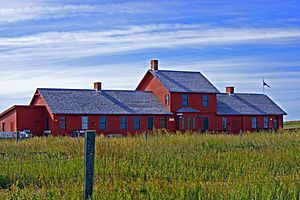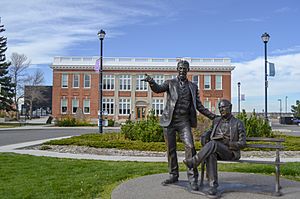Alexander Tilloch Galt facts for kids
Quick facts for kids
Sir Alexander Tilloch Galt
|
|
|---|---|
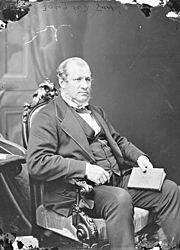
Sir Alexander Tilloch Galt in 1869
|
|
| Member of the Canadian Parliament for Town of Sherbrooke |
|
| In office 1867–1872 |
|
| Preceded by | District created |
| Succeeded by | Edward Towle Brooks |
| Minister of Finance | |
| In office July 1, 1867 – November 7, 1867 |
|
| Succeeded by | Sir John Rose, 1st Baronet |
| 1st Canadian High Commissioner to the United Kingdom | |
| In office 1880–1883 |
|
| Personal details | |
| Born | September 6, 1817 Chelsea, England |
| Died | September 19, 1893 (aged 76) Montreal, Quebec, Canada |
| Resting place | Mount Royal Cemetery |
| Political party | Liberal-Conservative |
| Spouses |
Elliott Torrance
(m. 1848; Amy Gordon Torrance
( |
| Relations | Sir Hugh Allan (cousin) Alexander Tilloch (grandfather) |
| Children | 11, including Elliott |
| Parent | John Galt |
Sir Alexander Tilloch Galt, GCMG CB PC (born September 6, 1817 – died September 19, 1893) was a very important Canadian politician. He is known as one of the "Fathers of Confederation." This means he helped create Canada as a country. He also played a big role in developing businesses and industries in early Canada.
Contents
Early Life and Family
Alexander Galt was born in Chelsea, England, on September 6, 1817. His father was John Galt, a Scottish writer and colonizer. His mother, Elizabeth, was the daughter of Alexander Tilloch, a journalist and inventor.
Alexander Galt was also a cousin of Sir Hugh Allan. Sir Hugh Allan owned the Allan Shipping Line, which was a huge shipping company. Alexander Galt went to school at Reading School in England.
Political Career
Alexander Galt was part of the "Great Coalition" government in the Province of Canada. This group worked to bring different parts of British North America together to form Canada.
He was even asked to become the leader of the Province of Canada. But he thought someone else would be better. So, he suggested George-Étienne Cartier and John A. Macdonald lead the new government together.
Cartier and Macdonald then asked Galt to become the Inspector-General of Canada. He agreed, but only if they promised to make Confederation a main goal. Confederation was the idea of uniting the British colonies into one country.
In 1858, Galt suggested that the Province of Canada ask the British government to create a federal union. This union would include Canada East (now Quebec) and Canada West (now Ontario), along with Prince Edward Island, Newfoundland, New Brunswick, Nova Scotia, and Rupert's Land. His idea was accepted!
Galt, along with John Ross and Sir George-Étienne Cartier, traveled to London. Their mission was to convince the British government to create the first self-governing country within the British Empire, which would be Canada.
Financial Leadership
As Inspector-General, Galt made big changes to Canada's banking system and trade rules. He helped create the Cayley-Galt Tariff. This was a special tax on imported goods. It was designed to protect Canadian businesses, but it made some people in Britain and the United States unhappy.
On July 1, 1867, Canada East, Canada West, New Brunswick, and Nova Scotia officially formed the Dominion of Canada. This was a huge step! Alexander Galt became the very first Minister of Finance for the new country.
In this new role, he changed some of his earlier policies. He started to encourage more trade within the British Empire. However, he disagreed with Macdonald and Cartier about a bank called the Commercial Bank of Canada. Because of this disagreement, Galt resigned from his government job. He continued to serve as a Member of Parliament (MP) until 1872.
Diplomatic Role
Even after leaving the government, Galt remained important in Canadian business and politics. In 1877, the British government chose him to represent them in the Halifax Fisheries Commission. This commission dealt with American fishing rights in Canadian waters.
Later, Galt became Canada's unofficial representative in London. He also traveled to France and Spain to make trade deals for Canada. The British government wasn't happy that Canada was starting to have its own foreign policy. So, they asked that Galt's position be made official.
In 1880, Alexander Galt became the first Canadian High Commissioner in London. This was the most important Canadian government office outside of Canada at the time. He held this important job until June 1, 1883.
Business Ventures
Sir Alexander Galt and his son, Elliott Torrance Galt, used their connections in Ottawa to help Elliott get a job as Assistant Indian Commissioner in southern Alberta. Alexander knew there was a lot of coal in that area and that a railroad would soon be built. He saw a great chance for business.
Coal and Railways
Alexander Galt sent people to find the best place for a coal mine in southern Alberta. They found a good spot near the Oldman River. In 1882, miners opened the first mine there.
Alexander then started the North Western Coal and Navigation Company. He got English investors to help, and a man named William Lethbridge became the company's president. The mining community, originally called Coalbanks, was renamed Lethbridge in his honor in 1885.
The Galts also created the Alberta Railway and Coal Company. They built two narrow-gauge rail lines. They hoped these railways would bring more businesses and settlers to the region. One line went east, and the other went south to Montana. The Canadian government supported their efforts.
The government gave the Galts' companies large areas of land in southern Alberta. This was in exchange for building the railways. The Galts wanted to sell this land to new settlers, but not as many people moved there as they expected.
Irrigation Projects
In 1886, a man named Charles Ora Card came to Canada to start a colony for the Church of Jesus Christ of Latter-day Saints (LDS). He chose a dry area near what is now Cardston.
Card encouraged the Galts to start a big irrigation project to bring water to the dry land. Even though it was hard to get money during a recession, the Galts formed the Alberta Irrigation Company. They bought land from their railway company for future irrigation projects.
For almost ten years, Galt and others worked hard to get more money from the government for irrigation. In 1896, the Canadian government and the Canadian Pacific Railway (CPR) agreed to help. They provided money, built a railway line, and cleared some of the Galts' debts.
In 1898, the leaders of the LDS Church in Utah made a deal with Galt. The Church agreed to provide skilled workers to build 50 miles of irrigation canals. They also promised to settle two new communities along the canal with at least 250 colonists each. These communities became the Village of Stirling and the Town of Magrath.
By 1900, over 95 miles of canals were finished. This included a main canal from the St. Mary River to Lethbridge.
More and more people started moving to southern Alberta around 1905. The government, the CPR, and the Galts promoted the region heavily. People lined up for land until the First World War began. Galt's sugar beet farms and factory at Raymond showed that farming could be very successful in southern Alberta.
Other Ventures
Galt's company, the North Western Coal and Navigation Company, changed its name several times as it grew into railways and irrigation.
In 1910, a new part was added to the Galt Hospital in Lethbridge. Today, this 1910 building is part of the Galt Museum & Archives. The museum has grown and added new parts to the building over the years.
Alexander Galt also started The Guarantee Company of North America in 1872. This company helped guarantee that employees of railroads and the government would be honest. Today, it is a very large company in Canada.
Personal Life
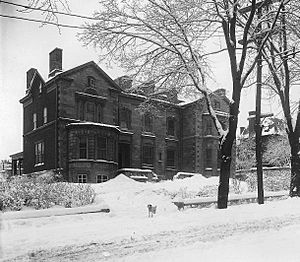
Alexander Galt married Elliot Torrance in 1848. She was the daughter of a merchant from Montreal. Sadly, Elliot died in 1850, shortly after giving birth to their only son, Elliott Torrance Galt. Elliott later became a businessman like his father.
Later, Alexander Galt married Elliot's younger sister, Amy Gordon Torrance. Amy and Alexander had seven daughters and two more sons. They lived in a house Galt built in Montreal.
Galt was open-minded about religion. He supported both the Methodist and Anglican churches, even though his wife, Amy, was a Presbyterian. He was also a Freemason in Sherbrooke.
Alexander Galt passed away in Montreal, Quebec, on September 19, 1893. He is buried in the Mount Royal Cemetery in Montreal.
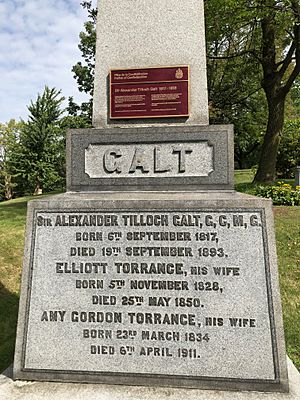
Legacy
Alexander Galt has several places named after him:
- Avenue Galt in Verdun, Quebec, Montreal.
- In Sherbrooke, Quebec, there are two streets: rue Galt Est/Ouest and rue Alexandre. The Quartier Alexandre, a downtown area, is also named after him.
- There is a high school in Sherbrooke called Alexander Galt Regional High School.
- The Galt Gardens public park and the Galt Museum & Archives (which used to be a hospital) in Lethbridge, Alberta are named after him.
Alexander Galt was played by actor Patrick McKenna in the 2011 CBC Television film John A.: Birth of a Country.
See Also
- Fathers of Confederation
- History of Canada
Images for kids
 | Claudette Colvin |
 | Myrlie Evers-Williams |
 | Alberta Odell Jones |


